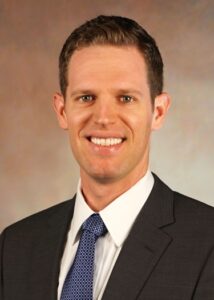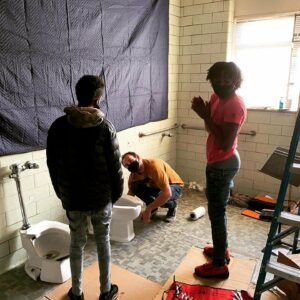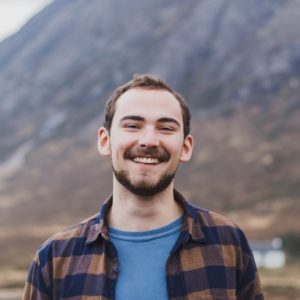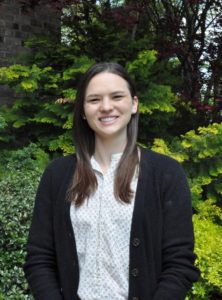Tales from the Front Lines

Dr. Nate Balmert, Precious Blood Volunteer alumnus from the 2013-2014 Volunteer Year
by Dr. Nate Balmert, Precious Blood Volunteer Alumnus
In March 2020, during the first wave of the COVID-19 pandemic, I remember my ICU attending supervisor reflecting about how boring it was rounding on an entire floor of patients affected by the devastating virus.
I remember feeling helpless during my first weeks as a resident in the Intensive Care Unit—and so little was known at that time about a virus that could kill previously young and healthy patients with such devastating quickness and prove to be harmless for others. I remember the annoyingly loud “I’m Walking on Sunshine” that rang out overhead whenever a patient was discharged. This contrasted with the eerie silence that rang out through the rest of the hospital, with visitors restricted and elective cases canceled.
Being a healthcare professional during a once- in-a-century pandemic very quickly became a mundane experience, as hospital volume slowed, and the air surrounding the very patients we were called to help as doctors, but more importantly as Christians—became poisonous. We learned how to gown up and protect ourselves before going in to save our patients, remembering that “during a pandemic there are no emergencies.”
It was too dangerous to perform morning physical exams, and the patients quickly became numbers on a computer. It was unimaginable to have to call family members and tell them that their loved ones were doing poorly. We were able, however, to provide one last benefit for a patient before he or she was intubated and drew their last breaths of air on their own. We had tablet computers in the ICU. In the past, these devices were symbols of a disconnected society. I will never forget the gratefulness in their voice, telling families they could video chat and the love that they were able to share miles apart.
The pandemic’s victims were not only the patients in the intensive care unit. My colleagues suffered from terrible burnout. I remember talking to one senior resident who had become suicidal—not from overwork, but from the time at home alone and emptiness of “social” distancing. Helplessness was rampant, and doctors often no longer felt that they were able to continue helping people in the ways they had envisioned when they went to medical school.
I read recently that nursing home residents were not just impacted physically by the virus—with visitors restricted, many suffered from loneliness. They couldn’t get the same care and attention from the nursing home staff. My grandfather, Richard Balmert, was one of those who died during the pandemic at the age of 96. He never caught COVID, his heart failing just as my parents and family were restricted from visiting him weekly in person at the nursing home. He had survived World War II, outlived four wives and countless friends, but would not survive 2020. Fortunately, he was able to move into my uncle’s house and be with those who loved him during his final breaths as his heart finally failed him.
I write this now, taking a break as I recover from COVID-19 myself. Even though I likely caught the virus while helping to take care of patients with COVID-19, I still have guilt that I cannot keep working. The symptoms are at the same time strange and familiar as I struggle tasting foods I once loved. I also remember seeing patients come into the hospital with the same symptoms as I have now, shortness of breath, sweat, fatigue—but most of all fear of what might come.
One father and son I remember presented with COVID-19, out of breath and afraid. I knew I could not promise that they both would leave the hospital alive, but I also knew I could promise I would be there for them at that moment. The son was stricken more by fear—of his health and of his father’s—than of the virus itself. This all-consuming fear can be as contagious and as destructive as the virus itself. Fear breeds mistrust of our fellow American, of leaders who were not able to rise up to the occasion, of our economic future, and fear that God will abandon us when we need him the most.
I am feeling much better than I did last week, and with vaccines in production I know that the end of the pandemic is in sight. I know that this year has changed me, as I have learned so much about medicine and about healing and about myself. But I also know that God was with us this whole time.
God was there in that final conversation between loved ones before intubation. He was with families waiting patiently by the phone day after day. He was with those whose livelihoods were forever altered by the pandemic. He was with my wife Sarah and me, as we married during a pandemic with only our immediate families. But he was also there via Zoom as our extended families and friends watched and celebrated while watching on YouTube. For those longing for God and the saints with religious ceremonies canceled or moved online, God will be with us wherever we need and look for Him. And he will be with us when someday soon we can love and offer the sign of peace in person once again.
This reflection originally appeared in the January 2021 edition of the “New Wine Press.”
Nate served as a Precious Blood Volunteer in the 2013-2014 Volunteer cycle at Truman Medical Center in Kansas City, Missouri. Go to preciousbloodvolunteers.org to learn more about Precious Blood Volunteers.


 Mike was born and raised in Lahaina, Hawaii, and is our first volunteer from Hawaii! He will be serving at both
Mike was born and raised in Lahaina, Hawaii, and is our first volunteer from Hawaii! He will be serving at both 
